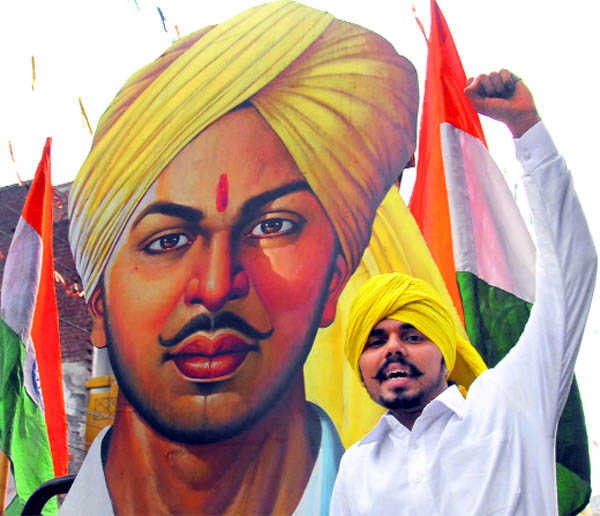Writing in 1923 when he was barely 16, Bhagat Singh in his essay "Punjab: The Problem of Language and Script," was erudite enough to understand the value of the intellectual in society. "Perhaps Garibaldi could not have succeeded in mobilising the army with such ease if Mazzini had not invested his 30 years in his mission of cultural and literary renaissance", he wrote. While the article in question was a musing on the then-tricky issue of the Punjabi language and its script, at several points in the article, Bhagat Singh makes pointed references to the value of intellectuals and of intellectualism.
In the same piece, writing about the Russian Revolution, he talks about the contribution of Karl Marx, Leo Tolstoy and Maxim Gorky in creating the atmosphere of awareness that led to the revolution. He extolls the role of Rousseau and Voltaire in the French Revolution. Bhagat Singh even chooses to see the role of Kabir, Guru Nanak and Guru Arjan in intellectual terms. By creating a literature that conveyed their ideas and beliefs, Bhagat Singh was clear that they were operating as much in the intellectual realm as they were in the spiritual realm. His views are in marked contrast to the current mood of the nation that has chosen the "simple" in preference to the "intellectual".
Another essay, “Communal Problem and its Solution”, written in June 1928, also resonates well with present-day realities. It begins with a statement that is not out of place even today: “At present, India is in a deplorable state. The adherents of one religion are sworn enemies of another faith.” It then goes on to discuss the state of affairs in the country then. The role of leaders and the press in fomenting communal trouble is discussed in less-than-laudatory terms. The press would do well to pay heed to Bhagat Singh’s words even today. It ought to play an educative role and foster love, he says, but instead it chooses to preach "…ignorance, narrow-mindedness (and) communalism to destroy our common heritage and nationalism".
A number of economic problems in India arise because agriculture is a failing profession, resulting in the collapse of the village economy and mass migration to cities. Given that agriculture is still the victim of utter apathy on the part of the administration, it is unlikely that this issue will be addressed any time soon. The irony is that economic problems notwithstanding, a sense of false supremacy grips our national imagination today. We have convinced ourselves that we are a superpower and demand respect on the world stage. We have also come to believe that one religious community is responsible for derailing our progress. If they can be "fixed", nothing can stop us from taking our "rightful" place among the world's leading nations. We repeat these lies to ourselves ad nauseam and have come to believe them.
In this context, Bhagat Singh's essay, "Universal Brotherhood: Indian Perspective," published in November 1924, has a few ideas that might be worth more than a passing thought. He discusses the Sanskrit slogan Vasudeva Kutumbhakam in the initial part of the essay. He imagines a world that is completely equal and "devoid of otherness". The concept of the other has ceased to exist. Everyone who exists are our own. There is no hunger and there is complete trust. In fact, heaven would no longer be a place of aspiration given that earth itself is better than heaven. It is a breathtaking image.
The essay is bereft of prejudices and seeks to build a better world for all, regardless of caste, creed or religion. Bhagat Singh even speaks of blacks and whites learning to live in perfect harmony with each other. The essay is not merely an exercise in dreaming the perfect dream and leaving it to others to lay out the road map. In the latter part, there is a strident call for action. It seeks to incite and provoke. One sees in this essay an early version of the thinking that later led to the shooting of Saunders.
As a nation, we are in a bind today. We have voluntarily put blinkers on our thinking and placed our trust in a single individual who seeks to control every detail of our life and deflects our attention by mouthing skin-deep slogans. Imagined past glories are being peddled en masse and people are buying into it lock, stock and barrel.Grandiose super-power dreams and the anointing of innocent people as enemies have obscured the realities that demand our attention.
Bhagat Singh speaks to us from across time and space. He reminds us that we have to appreciate the value of the intellectual and seek in our own modest ways to become Bhagat Singhs ourselves through reflection and thoughtful action. He also reminds us that basic livelihood issues are far from solved for a big chunk of the nation's population. Any superpower ambitions in the face of that reality is wishful thinking. His words are a reminder of the eternal truth of that beautiful term Vasudeva Kutumbhakam. To revisit Bhagat Singh is to reinforce our commitment to the inclusive idea of India and indeed, the whole world.
The author is an editor with a publishing firm and a freelance writer. The views expressed are personal.
Unlock Exclusive Insights with The Tribune Premium
Take your experience further with Premium access.
Thought-provoking Opinions, Expert Analysis, In-depth Insights and other Member Only Benefits
Already a Member? Sign In Now











